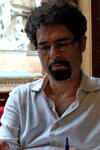Angelo Cattaneo
Courses
EAST 414, HSAR 615
Mapping and Translating Spaces, Cultures, and Languages (1500–1700)
This course combines the methods of history with those of linguistics and translation studies to promote an innovative interdisciplinary analysis of the processes of cultural (mis)communication and (mis)translation among communities across the Iberian Empires and Royal Patronages between 1500 and 1700. This course has three main objectives: 1) mapping the emergence of multilingual communities in early modernity involving cultures and languages that were previously unknown in Europe; (2) drawing up a comprehensive typological catalogue of overlooked, dispersed metalinguistic and multilingual sources (reports, letters, Christian doctrines, maps, word lists, lexicons, grammars, visual material which described linguistic practices and\or display bilingual or three-lingual evidence) produced mostly in missionary contexts; and (3) within this broad “horizontal” survey, highlighting specific area studies to carry out an in-depth “vertical” comparative analysis of cultural-linguistic contacts and translations in America, Sub-Saharan Africa, and Asia, specifically chosen because they were paradigmatic, coeval, and sometimes antithetical cases detailing the different shades of cultural translations in colonial, imperial, and missionary contexts. The integration of two working strategies—the extensive typological mapping of intercultural multilingual sources and the analysis of case studies—allows us to undertake a comparative analysis of the processes related to the learning, imposing or rejection of cultures and languages in the “troubled pasts” of missionary and colonial contexts. The course aims to document the largest possible corpora of translations in early modernity and offers new ideas on the relevance of linguistic and cultural interactions and on our multicultural and multilingual “troubled present.” Participants also have the opportunity to analyze a selection of historical multilingual and metalinguistic documents (dictionaries, grammars, doctrines, maps) in the John Carter Brown Library collections, in Providence, RI, to discover how these documents have variously embodied cultural lenses, religious beliefs, and political concerns.

